可持续发展国际法【英文】
国际法概念英语作文
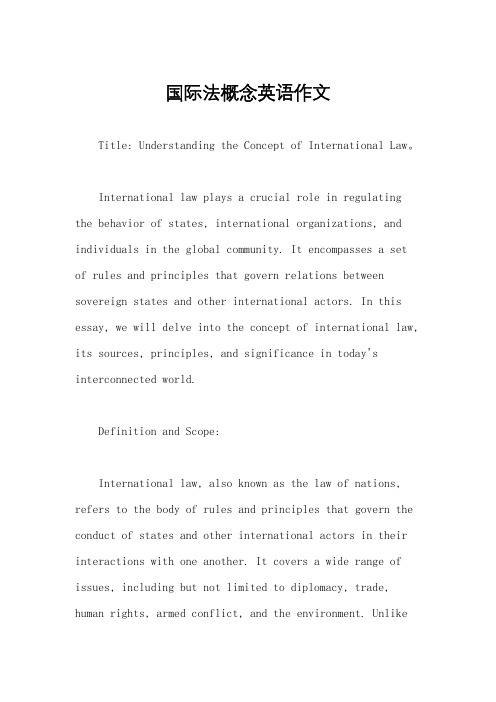
国际法概念英语作文Title: Understanding the Concept of International Law。
International law plays a crucial role in regulating the behavior of states, international organizations, and individuals in the global community. It encompasses a set of rules and principles that govern relations between sovereign states and other international actors. In this essay, we will delve into the concept of international law, its sources, principles, and significance in today's interconnected world.Definition and Scope:International law, also known as the law of nations, refers to the body of rules and principles that govern the conduct of states and other international actors in their interactions with one another. It covers a wide range of issues, including but not limited to diplomacy, trade, human rights, armed conflict, and the environment. Unlikedomestic law, which is enforced by a centralized authority within a sovereign state, international law lacks a global enforcement mechanism. However, its legitimacy and effectiveness rely on the consent and compliance of states.Sources of International Law:International law derives from various sources, including treaties, customary international law, general principles of law recognized by civilized nations, judicial decisions, and writings of legal scholars. Treaties, also known as conventions or agreements, are formal agreements between states that establish legally binding obligations. Customary international law arises from consistent state practice and the belief that such practice is legally required (opinio juris). General principles of law are basic legal principles recognized by the international community, such as principles of equity and justice. Judicial decisions and legal writings contribute to the development and interpretation of international law, particularly through the decisions of international courts and tribunals.Principles of International Law:Several principles underpin international law,including sovereign equality, the prohibition of the use of force, peaceful settlement of disputes, non-intervention, and respect for human rights. Sovereign equality recognizes that all states, regardless of their size or power, are equal members of the international community and enjoy certain rights and privileges. The prohibition of the use of force, enshrined in the United Nations Charter,prohibits states from using force or threatening the use of force against the territorial integrity or political independence of another state. Peaceful settlement of disputes encourages states to resolve their differences through negotiation, mediation, arbitration, or judicial settlement rather than resorting to armed conflict. Non-intervention prohibits states from interfering in the internal affairs of other states. Respect for human rights entails the protection and promotion of fundamental human rights and freedoms for all individuals, regardless oftheir nationality or status.Significance of International Law:International law plays a crucial role in promoting peace, stability, and cooperation among states. By providing a framework for the peaceful resolution of disputes and the protection of fundamental rights, international law helps prevent conflicts and mitigatetheir impact when they occur. It also facilitates cooperation on transnational issues such as climate change, terrorism, and global health pandemics. Additionally, international law serves as a mechanism for holding states and individuals accountable for violations of their obligations, thereby promoting justice and accountability on the international stage.Challenges and Future Prospects:Despite its significance, international law faces numerous challenges, including compliance issues, enforcement gaps, and the emergence of new threats such as cyber warfare and transnational terrorism. Moreover, theeffectiveness of international law is often hindered by the reluctance of states to relinquish their sovereignty and submit to supranational authorities. Nevertheless, the evolution of international law continues through state practice, judicial decisions, and diplomatic negotiations. Efforts to strengthen international institutions, enhance compliance mechanisms, and promote a culture of respect for the rule of law are essential for addressing these challenges and ensuring the continued relevance and effectiveness of international law in the 21st century.In conclusion, international law serves as a cornerstone of the international system, regulating the behavior of states and promoting cooperation, peace, and justice on the global stage. Despite its limitations and challenges, international law remains a vital tool for addressing the complex issues facing the international community and advancing the common good of humanity.。
常用国际法词汇
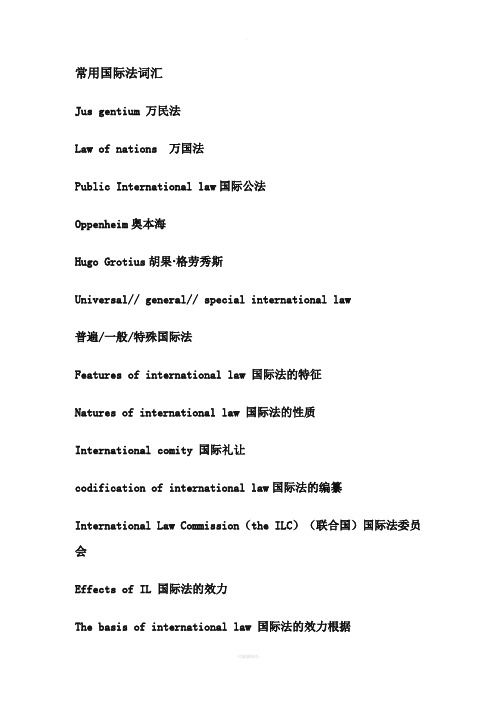
常用国际法词汇Jus gentium 万民法Law of nations 万国法Public International law国际公法Oppenheim奥本海Hugo Grotius胡果·格劳秀斯Universal// general// special international law普遍/一般/特殊国际法Features of international law 国际法的特征Natures of international law 国际法的性质International comity 国际礼让codification of international law国际法的编纂International Law Commission(the ILC)(联合国)国际法委员会Effects of IL 国际法的效力The basis of international law 国际法的效力根据Naturalists 自然法学派Positivists 实在法学派Gratians 格老秀斯派(Compromise school“折中”学派)social solidarity school社会连带法学派normalism 规范法学派theory of power politics权力政治说theory of policy-oriented政策定向说Congress of Westphalia 威斯特伐利亚公会Martin 丁韪良sources of international law国际法的渊源International custom国际习惯material element “物质因素”psychological element “心理因素”general practice通例Usage惯例opinio juris “法律确信”resolutions of international organizations国际组织的决议General principles of law一般法律原则judicial decisions 司法判例The teachings//writings of publicists 公法学家学说Contractual treaty 契约性条约Law-making treaty 造法性条约Application of IL 国际法的适用The relationship between international and domestic// municipal law国际法与国内法的关系Monism 一元论Dualism 二元论adoption//incorporation采纳//纳入transformation转化(把国际法规则内容制定为国内法规则)国际法的基本原则Fundamental principles of international law jus cogens强行法,亦称强制规律peremptory normSovereignty主权Principle of sovereign equality主权平等原则principle of non-intervention不干内政原则internal affairs内政matters within domestic jurisdiction国内管辖之事件"Humanitarian" intervention “人道主义”干涉Principle of self-determination民族自决原则The subjects of international law国际法主体International personality国际人格者Permanent population固定的居民Defined territory 确定的领土Government 政府Unitary state 单一国Composite states//union of states复合国//国家的联合Dependent country 附属国Federation 联邦Confederation 联邦Permanent neutralized state永久中立国British Commonwealth of Nations英联邦French Community法兰西共同体Vassal state 附庸国Suzerain state 宗主国Protected//protecting stateFUNDAMENTAL RIGHTS OF STATES国家的基本权利Right of independence 独立权Right of equality 平等权Right of self-defense 自卫权Right of self-preservation自保权Right of jurisdiction 管辖权Territorial jurisdiction /jurisdiction based on residence领域管辖/属地管辖Personal jurisdiction/jurisdiction based on citizenship 属人管辖/国籍管辖Protective jurisdiction 保护性管辖Universal jurisdiction 普遍管辖State immunity 国家豁免权par in parem non habet imperium拉丁语,“平等者之间无管辖权”The doctrine of absolute immunity绝对豁免原则The doctrine of relative or restrictive immunity 相对豁免原则 RECOGNITION AND SUCCESSIONrecognition of states and governments国家和政府的承认 States succession 国家继承territorial change 领土变更Unconstitutional regime change不合宪法的政权更迭Constitutive theory 构成说Declaratory theory 宣告说De jure recognition 法律上承认De facto recognition 事实上承认Effective control 有效统治Principle of effectiveness 有效统治原则doctrine of non- recognition不承认主义,如,史汀生主义(the Stimson doctrine )Estrada doctrine 艾斯特拉达主义——墨西哥的实践Recognition of national liberation movement民族解放运动组织的承认Insurgent body 叛乱团体 Belligerent body 交战团体 Personal treaty 人身条约dispositive//non-personal treaties非人身条约The clean s/plate rule 白板规则State property 国家财产 State debt 国家债务Localized state debt 地方化债务malicious debt “恶债”State archives 国家档案国际法律责任 responsibility in international law Internationally wrongful acts 国际不法行为international crimes国际罪行subjective responsibility主观责任说objective responsibility客观责任说Imputability//attributability可归责性或可归因性limitations of sovereignty限制主权restitution恢复原状compensation赔偿apology道歉liability for acts of international damage 国际损害行为的责任activities not prohibited by international law 国际法不加禁止行为state territory 国家领土Territory 领土territorial sovereignty 领土主权the acquisition and change of territory领土的取得与变更Occupation先占Terra nullius无主地Effective occupation有效占领Prescription时效Accretion添附Cession割让Conquest征服Plebiscite//referendum全民投票,又称全民公决Self-determination of peoples民族自决condominium 共管 lease租借Sphere of influence势力范围International servitude国际地役Boundary and frontier 边界与边境Antarctic Treaty System “南极条约体系”The sector principle 扇形原则The law of the sea 海洋法The UN Convention on the Law of the Sea 《联合国海洋法公约》Territorial sea领海Normal baseline正常基线,亦称“低潮线”the low water line Straight baseline 直线基线Innocent passage无害通过Contiguous Zone 毗连区Exclusive economic zone 专属经济区(EEZ )Continental shelf 大陆架Transit passage过境通行International straits国际海峡Transit passage过境通行Archipelagic waters群岛水域Archipelagic baselines群岛基线freedom of the high seas公海自由Flags of convenience 方便旗Piracy海盗,海盗行为Right of visit登临权Right of hot pursuit 紧追权International seabed area国际海底区域Common heritage of mankind人类共同继承财产The parallel exploitation regime“平行开发制”International Seabed Authority 国际海底管理局International air law国际航空法Air space空气空间Sovereignty of territorial airspace 领空主权State aircraft国家航空器Civil aircraft民用航空器Scheduled flight定期飞行即航班飞行Non- scheduled flight不定期飞行即非航班飞行Hijacking空中劫持either extradition or prosecution principle 或引渡或起诉Outer Space Law 外层空间法Outer space 外空Spacecraft航天器Space Objects 空间物体Registration system登记制度The principle of strict liability严格责任原则The principle of liability fault过失责任原则Residents of international law国际法上的居民Nationality国籍Original nationality固有国籍或原始国籍Jus sanguinis血统主义Jus soli出生地主义Acquired nationality继有国籍Naturalization入籍,旧称归化Double nationality双重国籍Conflict of nationality国籍的抵触//冲突Statelessness无国籍Diplomatic protection外交保护Exhaustion of local remendies用尽当地救济Passport护照 Visa签证National treatment国民待遇Most-favored- nation- treatment最惠国待遇Differential treatment差别待遇Reciprocal treatment 互惠待遇Preferential treatment优惠待遇Extradition引渡Non-extradition of political offender政治犯不引渡Asylum庇护Political refuge政治避难Territorial asylum域内庇护,亦称“领土庇护”Extraterritorial asylum 域外庇护Diplomatic asylum“外交庇护”Refugee identity难民身份Principle of non-refoulement不推回原则Diplomatic and Consular Relations Law外交和领事关系法Diplomatic relations 外交关系Consul领事Consular relations领事关系Mission/embassy使馆The head of the mission使馆馆长Ambassador大使Minister 公使chargé d'affaires (法)代办Persona non grata (拉)“不受欢迎的人”Unacceptable person“不可接受的人”diplomatic privileges and immunities外交特权与豁免Theory of extra-territorial jurisdiction 治外法权说Theory of personal representation代表说Theory of functional necessity职务需要说Diplomatic Corps外交团Special Missions特别使团Consular Privileges and Immunities领事特权与豁免THE LAW OF TREATIES国际条约法Bilateral treaties双边条约Multilateral treaties多边条约Law-making treaty造法性条约Contractual treaty契约性条约convention公//专约 treaty条约agreement 协定 charter宪章covenant ,statute 盟约、规约(general//final) act (总//最后)文件(additional//final )protocol(附加//最后)议定书exchange of notes 换文memorandum of understanding谅解备忘录declaration 宣言joint declaration//statement 联合声明joint communique 联合公报constitution 组织章程arrangement 补充协定treaty-making capacity 缔约能力treaty-making power 缔约权conclusion and entry into force of treaties条约的缔结和生效negotiation 谈判 initiating草签authentication 认证(full) signature 签署sanction of treaty 核准ratification, acceptance, approval批准、接受、赞同full representative全权代表full power 全权证书accession 加入reservation 保留pacta sunt servanda 约定必须信守(拉丁)application and interpretation of treaties适用与解释条约amendment, termination, suspen-sion of operation 条约的修改、终止与停止执行invalidity of treaties条约的无效amendment/modification修正/改provisional application 暂时适用material breach 重大违约fundamental change of circumstances 情势根本变更PEACEFUL SETTLEMENT OF INTERNATIONAL DISPUTES国际争端法the principle of peaceful settlement of international disputes justiciable//non-justiciable dispute可裁判的//不可裁判的争端amicable//compulsive settlement和谐//强迫解决方法Political methods //legal methods of settlements政治//法律解决方法retortion 反报 reprisals 报复pacific blockade 平时封锁negotiation 谈判consultation 协商inquiry//investigation 调查good offices 斡旋mediation 调停conciliation 和解The Permanent Court of Arbitration 常设仲裁法院judicial settlement 司法解决Permanent Court of International Justice 国际常设法院International Court of Justice国际法院Independent judges独立法官Judge ad hoc“专案法官”或“特别法官”(special judge)Contentious jurisdiction诉讼管辖权Advisory jurisdiction咨询管辖权Voluntary jurisdiction自愿管辖Conventional jurisdiction协定管辖Optional compulsory jurisdiction任意强制管辖Institution of proceedings起诉written//oral proceedings书面//口头程序memorial 诉状counter-memorial 反诉状regional agencies or arrangements区域机关和区域办法国际组织法League of Nations(国际联盟)United Nations(UN )联合国The purposes and principles of the United Nations联合国的宗旨和原则Original/elective member创始/纳入成员Decision-making //voting system 决策//表决制度United Nations Charter联合国宪章the General Assembly联合国大会the Security Council安全理事会Veto否决权the principle of unanimity of great powers大国一致原则Economic and Social Council经社理事会Trusteeship Council托管理事会Secretariat秘书处Secretary-General联合国秘书长Regional International Organizations区域性国际组织Specialized Agencies(联合国专门机构)The Collective Security System(联合国集体安全体制)The UN Peace-keeping Operations(联合国维和行动)复习备考(仅供参考,不可押题!)常见名词:⏹属地管辖权国际法不加禁止行为属人管辖权⏹无害通过引渡庇护过境通行⏹全权证书造法性条约草签⏹添附继有国籍人类共同继承财产⏹否决权斡旋安理会国际法院⏹登临权紧追权平行开发制⏹协定管辖任意强制管辖复习备考(仅供参考,不可押题!)⏹思考题:⏹论国际法与国内法之间的关系。
catti 单词本
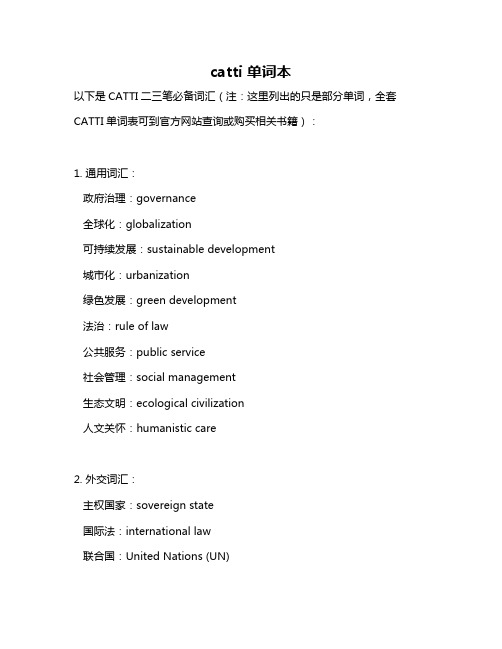
catti 单词本以下是CATTI二三笔必备词汇(注:这里列出的只是部分单词,全套CATTI单词表可到官方网站查询或购买相关书籍):1. 通用词汇:政府治理:governance全球化:globalization可持续发展:sustainable development城市化:urbanization绿色发展:green development法治:rule of law公共服务:public service社会管理:social management生态文明:ecological civilization人文关怀:humanistic care2. 外交词汇:主权国家:sovereign state国际法:international law联合国:United Nations (UN)安理会:Security Council国际关系:international relations外交政策:foreign policy外交途径:diplomatic channel国际组织:international organization国际合作:international cooperation国际条约:international treaty3. 经济词汇:市场经济:market economy国有企业:state-owned enterprise (SOE)外资企业:foreign-funded enterprise (FFE)私有企业:private enterprise经济全球化:economic globalization跨国公司:multinational corporation (MNC)对外贸易:foreign trade国际贸易:international trade关税壁垒:tariff barriers世界贸易组织:World Trade Organization (WTO) 区域经济一体化:regional economic integration 自由贸易区:free trade area (FTA)4. 社会文化词汇:社会福利:social welfare教育公平:fair education医疗卫生:medical and health care文化多样性:cultural diversity非物质文化遗产:intangible cultural heritage (ICH)知识产权保护:intellectual property protection (IPP)公共文化服务体系:public cultural service system (PCSS) 媒体融合:media convergence信息社会:information society。
可持续发展
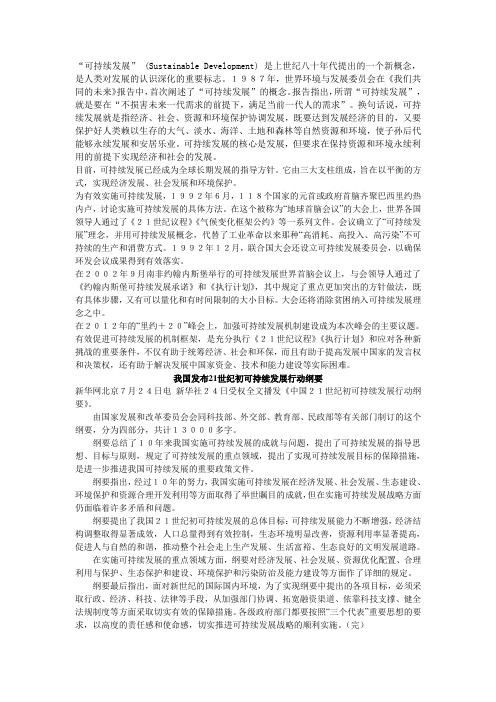
“可持续发展” (Sustainable Development) 是上世纪八十年代提出的一个新概念,是人类对发展的认识深化的重要标志。
1987年,世界环境与发展委员会在《我们共同的未来》报告中,首次阐述了“可持续发展”的概念。
报告指出,所谓“可持续发展”,就是要在“不损害未来一代需求的前提下,满足当前一代人的需求”。
换句话说,可持续发展就是指经济、社会、资源和环境保护协调发展,既要达到发展经济的目的,又要保护好人类赖以生存的大气、淡水、海洋、土地和森林等自然资源和环境,使子孙后代能够永续发展和安居乐业。
可持续发展的核心是发展,但要求在保持资源和环境永续利用的前提下实现经济和社会的发展。
目前,可持续发展已经成为全球长期发展的指导方针。
它由三大支柱组成,旨在以平衡的方式,实现经济发展、社会发展和环境保护。
为有效实施可持续发展,1992年6月,118个国家的元首或政府首脑齐聚巴西里约热内卢,讨论实施可持续发展的具体方法。
在这个被称为“地球首脑会议”的大会上,世界各国领导人通过了《21世纪议程》《气候变化框架公约》等一系列文件。
会议确立了“可持续发展”理念,并用可持续发展概念,代替了工业革命以来那种“高消耗、高投入、高污染”不可持续的生产和消费方式。
1992年12月,联合国大会还设立可持续发展委员会,以确保环发会议成果得到有效落实。
在2002年9月南非约翰内斯堡举行的可持续发展世界首脑会议上,与会领导人通过了《约翰内斯堡可持续发展承诺》和《执行计划》,其中规定了重点更加突出的方针做法,既有具体步骤,又有可以量化和有时间限制的大小目标。
大会还将消除贫困纳入可持续发展理念之中。
在2012年的“里约+20”峰会上,加强可持续发展机制建设成为本次峰会的主要议题。
有效促进可持续发展的机制框架,是充分执行《21世纪议程》《执行计划》和应对各种新挑战的重要条件,不仅有助于统筹经济、社会和环保,而且有助于提高发展中国家的发言权和决策权,还有助于解决发展中国家资金、技术和能力建设等实际困难。
发展与可持续的单词
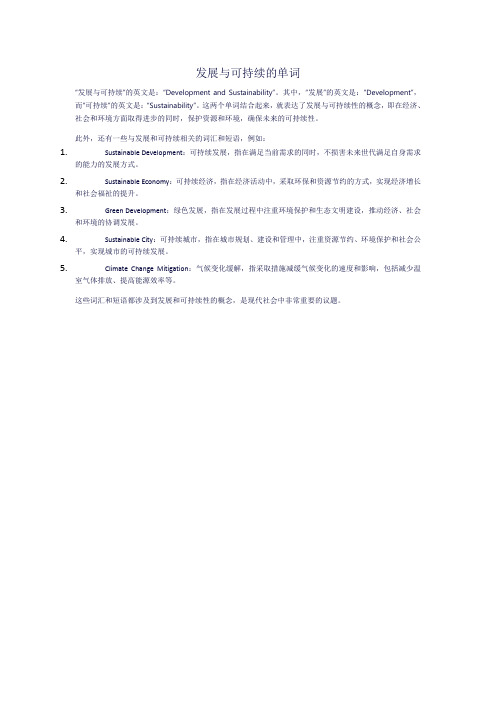
发展与可持续的单词
“发展与可持续”的英文是:“Development and Sustainability”。
其中,“发展”的英文是:“Development”,而“可持续”的英文是:“Sustainability”。
这两个单词结合起来,就表达了发展与可持续性的概念,即在经济、社会和环境方面取得进步的同时,保护资源和环境,确保未来的可持续性。
此外,还有一些与发展和可持续相关的词汇和短语,例如:
1.Sustainable Development:可持续发展,指在满足当前需求的同时,不损害未来世代满足自身需求
的能力的发展方式。
2.Sustainable Economy:可持续经济,指在经济活动中,采取环保和资源节约的方式,实现经济增长
和社会福祉的提升。
3.Green Development:绿色发展,指在发展过程中注重环境保护和生态文明建设,推动经济、社会
和环境的协调发展。
4.Sustainable City:可持续城市,指在城市规划、建设和管理中,注重资源节约、环境保护和社会公
平,实现城市的可持续发展。
5.Climate Change Mitigation:气候变化缓解,指采取措施减缓气候变化的速度和影响,包括减少温
室气体排放、提高能源效率等。
这些词汇和短语都涉及到发展和可持续性的概念,是现代社会中非常重要的议题。
法律英语口语900句 (13):International law国际法
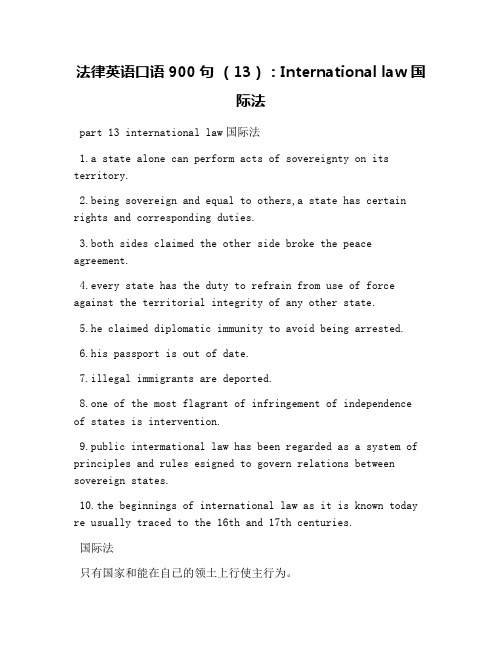
法律英语口语900句(13):International law国际法part 13 international law国际法1.a state alone can perform acts of sovereignty on its territory.2.being sovereign and equal to others,a state has certain rights and corresponding duties.3.both sides claimed the other side broke the peace agreement.4.every state has the duty to refrain from use of force against the territorial integrity of any other state.5.he claimed diplomatic immunity to avoid being arrested.6.his passport is out of date.7.illegal immigrants are deported.8.one of the most flagrant of infringement of independence of states is intervention.9.public intermational law has been regarded as a system of principles and rules esigned to govern relations between sovereign states.10.the beginnings of international law as it is known today re usually traced to the 16th and 17th centuries.国际法只有国家和能在自已的领土上行使主行为。
国际公法_英文名解汇总_纲目版
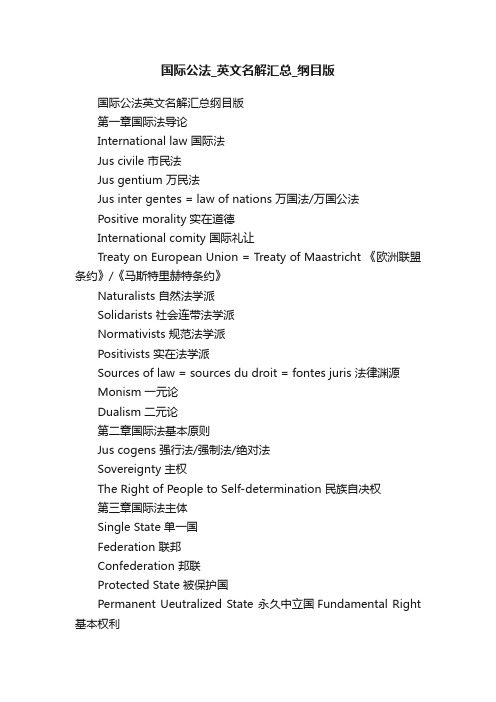
国际公法_英文名解汇总_纲目版国际公法英文名解汇总纲目版第一章国际法导论International law 国际法Jus civile 市民法Jus gentium 万民法Jus inter gentes = law of nations 万国法/万国公法Positive morality 实在道德International comity 国际礼让Treaty on European Union = Treaty of Maastricht 《欧洲联盟条约》/《马斯特里赫特条约》Naturalists 自然法学派Solidarists 社会连带法学派Normativists 规范法学派Positivists 实在法学派Sources of law = sources du droit = fontes juris 法律渊源Monism 一元论Dualism 二元论第二章国际法基本原则Jus cogens 强行法/强制法/绝对法Sovereignty 主权The Right of People to Self-determination 民族自决权第三章国际法主体Single State 单一国Federation 联邦Confederation 邦联Protected State 被保护国Permanent Ueutralized State 永久中立国Fundamental Right 基本权利Secondary Rights 派生权利Right of Independence 独立权Right of Equality 平等权Right of Self-preservation 自保权Right of Jurisdiction 国家管辖权Territorial Jurisdiction 属地管辖权/属地优越权Personal Jurisdiction = nationality jurisdiction = active personality principle 属人管辖权/国籍管辖/积极国籍管辖Protective Jurisdiction = passive personality principle 保护性管辖权/消极国籍管辖Universal Jurisdiction 普遍性管辖权Judicial immunities 外国国家的司法豁免权Recognition 国际法上的承认Effective control 有效统治Succession 国际法上的继承第四章国际法上的居民Nationality 国籍Inhabitant 居民Original nationality 原始国籍/出生国籍Jus sanguinis 血统主义Jus soli 出生地主义Acquired nationality 因加入而取得国籍Naturalization 入籍/归化Release 放弃(国籍)Deprive 剥夺(国籍)Dual nationality 双重国籍Active conflicts 国籍的积极抵触Stateless person 无国籍人Passive conflicts 国籍的消极抵触Alien 外国人Deportation 驱逐出境National treatment = doctrine of equality of treatment = NT 国民待遇/平等待遇原则International standard of treatment “文明世界”的“国际标准”/“最低标准”Most favorable national treatment = MFNT 最惠国待遇Differential treatment 差别待遇Extradition 引渡Principle of Non-extradition of Political Offenders 政治犯不引渡原则Attentat clause = Assassination Clause 行刺条款/比利时行刺条款/暗杀条款Principle of identity 相同原则/罪名同一原则/双重犯罪原则Principle of speciality 罪行特定原则Asylum 庇护Territorial asylum 领域庇护/域内庇护Extra-territorial asylum 域外庇护Refugee 难民Nansen passport 南森护照Convention refugees 公约难民Mandate refugees 章程难民Principle of non-refoulement 不推回原则/禁止驱逐、送还原则Diplomatic protection 外交保护Doctrine of continuous nationality 国籍连续原则Exhaustion of local remedies 用尽国内救济原则Calvo clause 卡尔沃条款Calvo doctrine 卡尔沃主义第五章国家法律责任International responsibility 国际法律责任/国际责任Primary rules 确定合法、非法的行为规则/是非规则/首要规则Secondary rules 国际法律责任规则/一般法律责任规则/责任规则/次级规则Distress 危难Necessity 危急情况Restitution 恢复原状Reparation 广义赔偿Compensation 狭义赔偿/经济赔偿Satisfaction 抵偿第六章领土法Land territory 领陆Territory Waters 领水Air space 领空Subsoil beneath state territory 底土Enclave 飞地Ownership 所有权Domination 统治权Condominium 共管Leased territory 租借International servitude 国际地役Internal waters 内水Internal rivers 内河Boundary rivers 界河Non-national rivers 多国河流International rivers 国际河流Inter-oceanic canals 通洋运河Occupation 先占/占领Vacant land 无主地Effective occupation 有效占领Prescription 时效Accretion 添附Cession 割让Conquest 征服Plebiscite 全民投票/全民公决Self-determination of peoples 民族自决The exchange of territory 交换领土Reversionary rights 收复失地Boundaries of state territory 国家边界第七章国际海洋法The common heritage of mankind 人类共同继承财产The United Nations Convention on the Law of the Sea 《联合国海洋法公约》Base line 基线Normal baseline 正常基线Straight baseline 直线基线Archipelagic baseline 群岛基线Innocent passage 无害通过Contiguous zone 毗连区/邻接区/海上特别区Exclusive economic zone 专属经济区Continental shelf 大陆架High seas 公海Flag of convenience 方便旗Right of visit 登临权/临检权Right of hot pursuit 紧追权Straits used for international navigation 用于国际航行的海峡Transit passage 过境通行Archipelagic waters 群岛水域Right of archipelagic sea lanes passage 群岛海道通过权International sea-bed area 国际海底区域Single exploitation system 单一开发制Parallel exploitation system 平行开发制第八章国际航空法Air defence identification zone = ADIZ 防空识别区/空中识别区Cabotage 国内载运权The International Civil Aviation Organization = ICAO 国际民用航空组织Dol = wilful misconduct (承运人的)加害行为/故意造成损害的不法行为/故意的行为/不在乎地不顾后果的行为Two tier liability “双梯度”责任制度/两级责任制Aut dedere aut judicare 或引渡或起诉原则Aut dedere aut punier 或引渡或处罚第九章外层空间法Outer space 外层空间第十章国际环境法Sustainable development 可持续发展Pollution from vessels 船舶污染Pollution by dumping 控制海洋倾倒Pollution from land-based sources 陆源污染第十一章外交关系法Consular provision 委任文凭Consular exequatur 领事证书Diplomatic relations 外交关系Consular relations 领事关系Diplomatic Privileges andImmunities外交特权与豁免第十三章国际条约法The Vienna Convention on the Law of Treaties 《维也纳条约法公约》Treaty 条约Convention 公约Convention 专约Agreement 协定Protocol 议定书Final act 最后议定书/蒇事议定书Covenant 盟约Charter 宪章Statute 规约Exchange of Notes 换文Declaration 宣言Joint statement 联合声明Bilateral treaty 双边条约Multilateral treaty 多边条约Negotiation (条约)谈判Full power 全权证书Adoption 议定Authentication 认证Signature 签署Ratification 批准Accession 加入Reservation 保留Registration 登记Publication 公布Pacta sunt servanda 条约必须遵守原则Pacta tertiis nec nocent nec prosunt 约定对第三者既无损,也无益Termination 条约的终止Invalidation 条约的失效Suspension 条约的暂停施行/条约的中止/条约的停止施行Interpretation 条约的解释Revision 条约的修订Amendment 条约的修正Modification 条约的修改第十四章国际组织法International organization 国际组织Inter-governmental organization 政府间组织International institutional law 国际组织法Concert of Europe 欧洲协商Non-governmental organization 非政府间国际组织Organization of petroleum exporting countries = OPEC 石油输出机构/石油输出国组织Organization for economic cooperation and development = OECD 经济协力开发机构/经济合作与发展组织/经合组织General Assembly 联合国大会Security Council 安全理事会/安理会Economic and Social Council 经济与社会理事会/经社理事会Trusteeship Council 托管理事会International Court of Justice 国际法院Secretariat 秘书处Specialized International Organization 专门性国际组织Specialized Agencies 联合国专门机构International telecommunication union = ITU 国际电信联盟Universal postal union = UPU 万国邮政联盟World meteorological organization = WMO 世界气象组织World health organization = WHO 世界卫生组织International labour organization = ILO 国际劳工组织Food and Agriculture Organization of the United Nations = FAO 联合国粮食及农业组织/联合国粮农组织United Nations Educational,Scientific,and Cultural Organization = UNESCO 联合国教科文组织International monetary fund = IMF 国际货币基金组织International bank for reconstruction and development = IBRD 国际复兴开发银行/世界银行International civil aviation organization = ICAO 国际民用航空组织International finance corporation = IFC 国际金融公司International maritime organization = IMO 国际海事组织International development association = IDA 国际开发协会World intellectual property organization = WIPO 世界知识产权组织International fund of agricultural development = IFAD 国际农业发展基金(组织)United Nations Industrial Development Organization = UNIDO 联合国工业发展组织World trade organization = WTO 世界贸易组织International atomic energy agency = IAEA 国际原子能机构Collective security 集体安全保障Peace-keeping operations = PKO 联合国维持和平行动Regional organization 区域性国际组织Organization of American States = OAS美洲国家组织Arab League = League of Arab States = AL = LAS 阿拉伯国家联盟/阿拉伯联盟/阿盟African union = AU 非洲联盟/非盟Organization of African Unity = OAU 非洲统一组织/非统组织Association of Southeast Asian Nations = ASEAN 东南亚国家联盟/东盟European community = EC 欧洲共同体ECSC 欧洲煤钢共同体EUBATOM 欧洲原子能共同体EEC 欧洲经济共同体European union = EU 欧洲联盟Shanghai Cooperation Organization =SCO 上海合作组织/上合组织Asian-Pacific Economic Cooperation organization = APEC 亚太经合组织第十五章国际人权法Human Rights 人权The responsibility to protect 保护的责任The Universal Declaration of Human Rights 《世界人权宣言》The International Covenant on Civil and Political Rights 《公民权利和政治权利国际公约》The International Covenant onEconomic,Social and Cultural Rights 《经济、社会和文化权利国际公约》第十六章国际刑法International criminal law 国际刑法International crimes 国际犯罪The direct enforcement model 直接执行模式The indirect enforcement model 间接执行模式International penal judicial assistance 国际刑事司法协助Extradition 引渡Principle of non-extradition of political offenders 政治犯不引渡原则Assassination Clause = Attentat clause 行刺条款/暗杀条款/比利时行刺条款Transfer jurisdiction of criminal procedure 刑事诉讼移管/刑事诉讼移转管辖Recognition and enforcement of foreign penal judgements 外国刑事判决的承认和执行International criminal jurisdiction 国际刑事管辖第十七章国际争端法International disputes 国际争端Legal disputes = justiciable disputes 法律性质的争端/可裁判的争端Political disputes = Non-justiciable disputes 政治性质的争端/不可裁判的争端Compulsive means 强制方法Negotiation 谈判Consultation 协商Good office 斡旋Mediation 调停International inquiry 国际调查/调查Conciliation 和解/调解Bryan peace treaties 《布赖恩和平条约》/冷却条约International arbitration 国际仲裁/国际公断Jay treaty 杰伊条约Permanent court of arbitration 常设仲裁法院Judicial settlement 司法解决The permanent court of international justice 常设国际法院International court of justice 国际法院Contentious jurisdiction 诉讼管辖权Optional compulsory jurisdiction 任意强制管辖Connally reservation 康纳利保留条款Advisory jurisdiction 咨询管辖权Regional agency = Regional arrangement 区域机关/区域办法第十八章战争法Law of war 战争法Law of armed conflict 武装冲突法Animo belligerendi 交战意向Jus ad bellum 诉诸战争权Suspension of arms 停战Surrender 投降International humanitarian law 国际人道法Crimes against humanity 违反人道罪War time neutrality 战时中立War neutrality law 战时中立法Permanent neutralized state 永久中立国/中立化国家War crimes 战争犯罪。
国际法英文名词解释
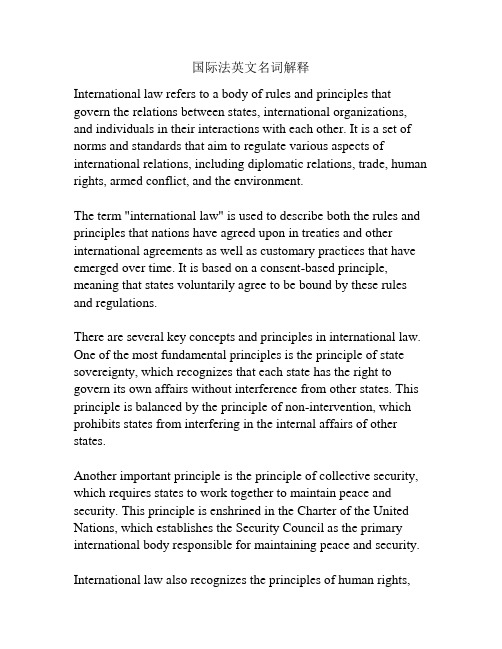
国际法英文名词解释International law refers to a body of rules and principles that govern the relations between states, international organizations, and individuals in their interactions with each other. It is a set of norms and standards that aim to regulate various aspects of international relations, including diplomatic relations, trade, human rights, armed conflict, and the environment.The term "international law" is used to describe both the rules and principles that nations have agreed upon in treaties and other international agreements as well as customary practices that have emerged over time. It is based on a consent-based principle, meaning that states voluntarily agree to be bound by these rules and regulations.There are several key concepts and principles in international law. One of the most fundamental principles is the principle of state sovereignty, which recognizes that each state has the right to govern its own affairs without interference from other states. This principle is balanced by the principle of non-intervention, which prohibits states from interfering in the internal affairs of other states.Another important principle is the principle of collective security, which requires states to work together to maintain peace and security. This principle is enshrined in the Charter of the United Nations, which establishes the Security Council as the primary international body responsible for maintaining peace and security. International law also recognizes the principles of human rights,which provide protections for individuals and groups from discrimination, torture, and other abuses. These principles are set out in a number of international treaties, including the Universal Declaration of Human Rights and the International Covenant on Civil and Political Rights.The enforcement of international law is a complex and multifaceted process. While states are primarily responsible for complying with and enforcing international law, there are also international courts and tribunals that help to ensure compliance. The International Court of Justice, for example, is the principal judicial organ of the United Nations and is responsible for settling legal disputes between states.Additionally, international law provides for the use of peaceful means to resolve conflicts, including negotiation, mediation, and arbitration. When peaceful means are not successful, states may resort to the use of force in self-defense or with the authorization of the United Nations Security Council.In recent years, the field of international law has expanded to include non-state actors, such as international organizations and individuals. International organizations, such as the United Nations and the World Trade Organization, play an increasingly important role in shaping and enforcing international law. Individuals can also be held accountable for serious international crimes, such as genocide and war crimes, through international tribunals like the International Criminal Court.In conclusion, international law is a complex and evolving fieldthat seeks to regulate the interactions between states, international organizations, and individuals. It is based on a set of rules and principles that aim to preserve peace, protect human rights, and promote cooperation among nations.。
- 1、下载文档前请自行甄别文档内容的完整性,平台不提供额外的编辑、内容补充、找答案等附加服务。
- 2、"仅部分预览"的文档,不可在线预览部分如存在完整性等问题,可反馈申请退款(可完整预览的文档不适用该条件!)。
- 3、如文档侵犯您的权益,请联系客服反馈,我们会尽快为您处理(人工客服工作时间:9:00-18:30)。
INTERNATIONAL LAW FOR SUSTAINABLE DEVELOPMENT:
Because Effective Laws Matter.
Contact:
Marie-Claire Cordonier Segger / Ashfaq Khalfan Centre for International Sustainable Development Law 3661 Peel Street, Montreal, Quebec, Canada Tel: +1 514 398 8918 / Fax: +1 514 398 8197 / partnership@
INTERNATIONAL LAW FOR SUSTAINABLE DEVELOPMENT
PARTNERSHIP
CISDL – IDLO – ILA
This presentation was made possible by the generous support of the Quebec Government.
with support from UNEP Legal, World Bank Legal, United Nations Treaty Secretariat, and links to many University Law Faculties and Academies around the world.
IDLO
INTERNATIONAL LAW FOR SUSTAINABLE DEVELOPMENT:
Introduction
INTERNATIONAL LAW FOR SUSTAINABLE DEVELOPMENT:
The Partners
IDLO
Centre for Internห้องสมุดไป่ตู้tional Sustainable Development Law International Development Law Organization International Law Association
: Access to Legal Information : Legal Research & Resource Materials : Capacity Building & Expert Dialogue
INTERNATIONAL LAW FOR SUSTAINABLE DEVELOPMENT:
INTERNATIONAL LAW FOR SUSTAINABLE DEVELOPMENT:
The Goal and Context
Focus: Significant legal developments in the field of sustainable development - legal research, education, advice and practice.
Goal: “To strengthen sustainable development governance and lay the foundation for implementation of international law for sustainable development.”
Our partnership facilitates scholarship on, access to, and compliance with coherent integrated international economic, social and environmental law. This initiative is geared to lawyers, law professors and students, judiciaries, and to non-lawyers, from developed and developing countries.
Links to the Global SD Agenda:
2002 WSSD JPOI:
2002 WSSD JPOI:
With regard to facilitating the implementation of sustainable development, the CSD should: “(e) Take into account significant legal developments in the field of sustainable development, with due regard to the role of relevant intergovernmental bodies in promoting the implementation of Agenda 21 relating to international legal instruments and mechanisms.” (2002 WSSD Plan of Implementation, Chapter XI, 148 e) Instruments and Mechanisms) and Chapter 38 (International Institutional Arrangements) of Agenda 21, states and other partners are urged to: ▪ To further develop international law on sustainable development, giving special attention to the delicate balance between environmental and developmental concerns (39.1.a.); ▪ To clarify and strengthen the relationship between existing international instruments or agreements in the field of environment and relevant social and economic agreements or instruments, taking into account the special needs of developing countries (39.1.b.); ▪ To provide developing countries with technical assistance in their attempts to enhance their national legislative capabilities in the field of environmental law (39.1.d). ▪ To integrate environment and development issues at national, sub-regional, regional and international levels, including in the United Nations system institutional arrangements (38.7).
INTERNATIONAL LAW FOR SUSTAINABLE DEVELOPMENT:
The Objectives
Develop a user-friendly web-based legal resource centre and network of inquiry to assess, exchange information and experiences, and promote int‟l law for sustainable development. Carry out legal research and experts workshops, to develop a series of legal briefs and capacity building manuals on legal developments in the field of sustainable development. Undertake capacity building and host dialogues on international sustainable development law (ISDL).
